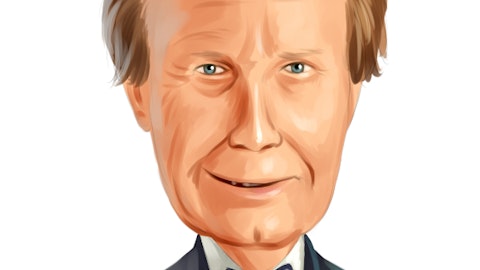Michael Scheopner : I think our average — our portfolio reprices on an average of, what is it, 50% of our portfolio reprices on an annual basis.
Mark Herpich : Annual basis. I think I’d be guessing a little bit, Mike, if I quoted that number that I don’t have at my fingertips right now. But like Michael said, I think as we look at repricing over a 1- or 2-year period, I think we are in the — just over 1-year as far as our portfolio rolling over so. And the fact that a number of those might be fixed with 1-year repricing versus immediate…
Unidentified Analyst: And then I may have missed it, but what’s the average duration on your securities portfolio?
Mark Herpich : We’re at 4.7 years currently.
Unidentified Analyst: And are you — as you roll over components in that portfolio, are you shortening the duration a little bit?
Mark Herpich : We’re probably not at the yields that are a little higher now looking at if we were to make some purchases, which we haven’t done a lot of this year, we’re going a little longer with the rates kind of elevated at this point. But our maturities we have in the next couple of years are our lowest yielding investments in the portfolio, but we’re needing to get a couple more years of roll off to get those treasury notes and lower-yielding investments to be removed and help out our unrealized loss on the portfolio.
Unidentified Analyst: Yes. It looks like given that you’re going to have some roll over the next 2 years that the unrealized loss will gradually decline. Is that a fair assessment?
Mark Herpich : Yes. Very much so, Mike.
Unidentified Analyst: Well, again, congratulations. I thought it was a very solid quarter, and I do like the continuation of the 5% stock dividend. My wife and my in-laws have been in the stock since the original conversion back in the 1980s. It’s been a great performer.
Michael Scheopner : Thanks, Mike. I appreciate the interest and continued interest in the company.
Operator: Our next question today comes from Ross Haberman from RLH Investments.
Ross Haberman : I got on a little late. So if I were repeat something you said, please tell me and we can take it offline. But I was just wondering if rates stay at these high levels hypothetically through ’24. They don’t go up anymore, but they just stay at these high levels. When do you think your margin will bottom out, given that scenario?
Mark Herpich : I guess we’re hoping that we’re nearing the bottom at this point, Ross. That may depend a little bit on how the Federal Reserve Bank continues. But as you said in your scenario, I guess, if they don’t do any raises, we think that we have bottomed out. We’re just not certain that they’ve quit their raising, but if they allow for a pause and let us to catch up with the rapid increase over the last year. I think that we feel like we are not at, we’re very near the bottom at this point in time and think that we should start seeing the pendulum turn a little bit. And little…
Ross Haberman : Let me ask it in a different way — In terms of your CDs repricing, have we seen most of those already repriced from the 1% to 2% levels after the 4-plus levels? Would you say we’re in the bottom of the eighth or top of the ninth inning in terms of that repricing process?
Mark Herpich : Yes. But I think we’re getting down to the closure coming out of the [bullpen], so to speak. And — but now some of those may have repriced 6 months ago and be set for a another reprice if we stay steady, which may be a little higher next year if they did a 1- or 2-year repricing, but the increase at that point won’t be near to the magnitude that it was on the first reset, so that would be my take, Ross.


